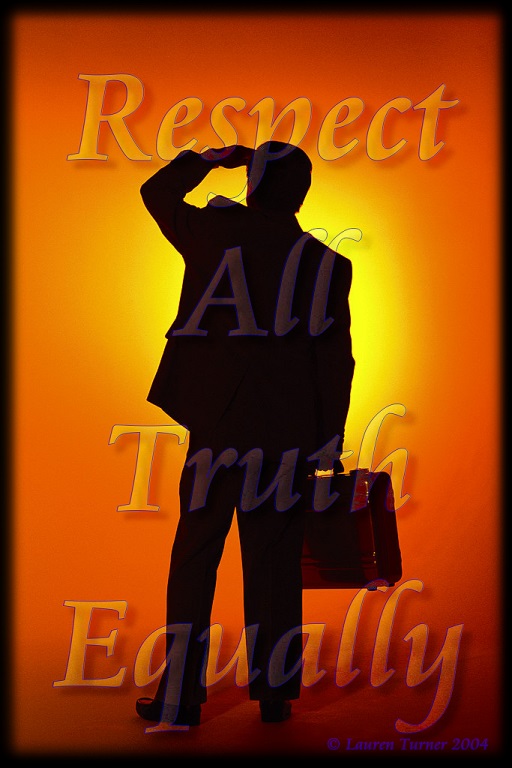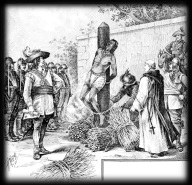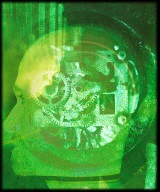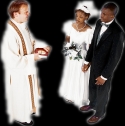

Vital Habit #7
Respect All Truth Equally
 Truth is truth. It does not matter the source
from which it comes. When the Bible seems to say one thing and Science seems to
say another we can’t say that one truth trumps another. God created the world
and the physical laws that govern it. Blindly dismissing all natural laws is
dismissing God just as blindly dismissing all scripture is dismissing God. When
the Bible and Science seem to disagree we need to immediately both rethink our
interpretation of the Bible and check our scientific research for mistakes. The
Scriptures, reason and common sense are all from God.
Truth is truth. It does not matter the source
from which it comes. When the Bible seems to say one thing and Science seems to
say another we can’t say that one truth trumps another. God created the world
and the physical laws that govern it. Blindly dismissing all natural laws is
dismissing God just as blindly dismissing all scripture is dismissing God. When
the Bible and Science seem to disagree we need to immediately both rethink our
interpretation of the Bible and check our scientific research for mistakes. The
Scriptures, reason and common sense are all from God.
 There are not different kinds of truth.
Sometimes there are different ways of looking at something, but if we dismiss
the concept of truth and error we have lost not only the basis of all of science
but also the basis of all theology as well.
There are not different kinds of truth.
Sometimes there are different ways of looking at something, but if we dismiss
the concept of truth and error we have lost not only the basis of all of science
but also the basis of all theology as well.
This is not to say that some sources of truth are not more reliable than others. The Bible is certainly more trustworthy than the National Enquirer, for example. When we don’t know the answer for sure, it is wise to trust the most reliable source. But when we have conclusive proof that one side is true, we have no right dismissing that truth on the basis that it didn’t come from the right source. God gave us a brain to think as well as a heart to believe in faith and God wants us to do both. Faith sometimes calls us beyond reason but never contrary to it. God will never ask us to shut off our brains and believe a lie. Faith and reason are partners not enemies.
God is truth and those who wish to know God the most fully must know how to find the truth. If we don’t stand for the truth we will fall for anything.
 I believe that the Bible contains the word of
God. But I also believe God has given us a brain and wants us to use it. This
fact has caused no end of trouble for me when dealing with people who prefer
blind faith. No one respects or loves the Bible more than me. I read through
it completely before I graduated from High School. I had entirely read through
three more translations at least once, through daily Bible Study by the time I
graduated from college. This was outside of the formal studies I did in both
the Old and New Testaments. I received an award from the American Bible Society
while I was still a Junior in undergraduate school. I have led Bible Study
groups which have examined every single book in the Bible as well as the entire
Apocrypha. For twenty six years I have studied a variety of commentaries and
deep examinations of Scriptural passages from a wide variety of sources every
week as I prepare sermons. I certainly don’t claim to be a world class Bible
scholar, … I’m saying all this not to boast, but rather to soften the
controversy of my next few statements. While I freely admit that I developed
the 9 Great Laws after a thorough examination of the Bible and I have prepared a
document showing dozens of Biblical passages backing up each of the laws, I
worry that this later document may encourage the dangerous practice of “Bibolotry”.
I define this as blind faith in one particular interpretation of the Bible
instead of true faith in God.
I believe that the Bible contains the word of
God. But I also believe God has given us a brain and wants us to use it. This
fact has caused no end of trouble for me when dealing with people who prefer
blind faith. No one respects or loves the Bible more than me. I read through
it completely before I graduated from High School. I had entirely read through
three more translations at least once, through daily Bible Study by the time I
graduated from college. This was outside of the formal studies I did in both
the Old and New Testaments. I received an award from the American Bible Society
while I was still a Junior in undergraduate school. I have led Bible Study
groups which have examined every single book in the Bible as well as the entire
Apocrypha. For twenty six years I have studied a variety of commentaries and
deep examinations of Scriptural passages from a wide variety of sources every
week as I prepare sermons. I certainly don’t claim to be a world class Bible
scholar, … I’m saying all this not to boast, but rather to soften the
controversy of my next few statements. While I freely admit that I developed
the 9 Great Laws after a thorough examination of the Bible and I have prepared a
document showing dozens of Biblical passages backing up each of the laws, I
worry that this later document may encourage the dangerous practice of “Bibolotry”.
I define this as blind faith in one particular interpretation of the Bible
instead of true faith in God.
 There are some who view their interpretation of
the Bible as the “ONLY” source of truth. Essentially this belief is popular
because people are intellectually lazy. They want a simple little set of rules
to follow and things to believe so that they don’t have to think and make
decisions. Unfortunately it’s not that easy. Even if you accept the entire
Bible as the infallible, inspired word of God, you still have to interpret it,
and contrary to the arrogant statements made by many Religious leaders, there is
no one cut and dried interpretation of the Bible. There are hundreds of
different Christian denominations which all claim to accept the Bible as the
divinely inspired word of God and yet each has a slightly different
interpretation of it. Some vary dramatically. Usually there are different
interpretations even within each denomination. It’s not just a simple matter of
“right” and “wrong” interpretations. There is usually considerable evidence
backing each interpretation.
There are some who view their interpretation of
the Bible as the “ONLY” source of truth. Essentially this belief is popular
because people are intellectually lazy. They want a simple little set of rules
to follow and things to believe so that they don’t have to think and make
decisions. Unfortunately it’s not that easy. Even if you accept the entire
Bible as the infallible, inspired word of God, you still have to interpret it,
and contrary to the arrogant statements made by many Religious leaders, there is
no one cut and dried interpretation of the Bible. There are hundreds of
different Christian denominations which all claim to accept the Bible as the
divinely inspired word of God and yet each has a slightly different
interpretation of it. Some vary dramatically. Usually there are different
interpretations even within each denomination. It’s not just a simple matter of
“right” and “wrong” interpretations. There is usually considerable evidence
backing each interpretation.
“The Bible says it, I believe it, that settles
it.” …is a pleasant illusion, but it’s not that simple. No one can argue that
there have not been extremely harmful misinterpretations of the Bible that were
widely accepted and seemed obvious at the time.
 As I mentioned in the 4th
Great Law, Religious leaders have used Bible quotations to support the
enslavement of Black Americans and the torture and murder of thousands of
“witches” in the Middle ages. The Bible itself gives the example of Satan
quoting the scripture to try and thwart God. Remember that? Think of the way
Satan tempted Jesus before his public ministry began.
As I mentioned in the 4th
Great Law, Religious leaders have used Bible quotations to support the
enslavement of Black Americans and the torture and murder of thousands of
“witches” in the Middle ages. The Bible itself gives the example of Satan
quoting the scripture to try and thwart God. Remember that? Think of the way
Satan tempted Jesus before his public ministry began.
So how then do we interpret the Bible
correctly? First of all, I hope I have raised some doubt in your mind to the
Biblical interpretations you already believe. This is not a lack of faith; it
is wisdom. Faith calls us to go beyond reason but never contrary to it.
 While faith the size of a mustard seed can move
mountains…healthy doubt the size of a mustard seed can protect us from a
mountain of lies. God gave us the scriptures, but God also gave us
brains and God doesn’t want us to shut off either.
While faith the size of a mustard seed can move
mountains…healthy doubt the size of a mustard seed can protect us from a
mountain of lies. God gave us the scriptures, but God also gave us
brains and God doesn’t want us to shut off either.
 This last sentiment suggests the answer. There
is not one source of truth, there are many. It is only when we respect all the
sources of truth God has given us and use them to check and balance each other
that we start to gain a healthy view of the truth. This is only common sense.
Which is the better way to find the truth: to listen only to selected facts, or
to examine all the evidence?
This last sentiment suggests the answer. There
is not one source of truth, there are many. It is only when we respect all the
sources of truth God has given us and use them to check and balance each other
that we start to gain a healthy view of the truth. This is only common sense.
Which is the better way to find the truth: to listen only to selected facts, or
to examine all the evidence?
 When you go to buy a car and one car dealer
encourages you to go and check out all the other dealerships in town before you
make a decision and another pressures you to make a deal on the spot and gets
angry when you suggest that you want to check a few other dealers first…what
does this suggest? Obviously those who are offering the best deal love
comparisons. Those who know they don’t have the best deal hate them. It is the
same way with people who claim to teach the truth. When they really have
something good to offer they encourage comparisons and independent
examinations. When they are insecure about what they are teaching they try to
forbid their followers from looking at anything else.
When you go to buy a car and one car dealer
encourages you to go and check out all the other dealerships in town before you
make a decision and another pressures you to make a deal on the spot and gets
angry when you suggest that you want to check a few other dealers first…what
does this suggest? Obviously those who are offering the best deal love
comparisons. Those who know they don’t have the best deal hate them. It is the
same way with people who claim to teach the truth. When they really have
something good to offer they encourage comparisons and independent
examinations. When they are insecure about what they are teaching they try to
forbid their followers from looking at anything else.
Jesus essentially said this when he said:
NIV John 3:20-21
20. Everyone who does evil hates the light, and will not come into the light for fear that his deeds will be exposed. 21. But whoever lives by the truth comes into the light, so that it may be seen plainly that what he has done has been done through God."
John Wesley, a powerful force behind many of the largest Protestant denominations of today, developed a check and balance system between four sources of authority:

SCRIPTURE: The time tested, extremely influential revelations given to spiritual leaders of the past…but subject to misinterpretation.

REASON: Common sense and logic. Science shows the tremendous power of this source. Yet science can’t answer the deepest spiritual questions. While logic is great at revealing error it is not capable of going beyond scientific facts and it is still subject to human error as history has repeatedly demonstrated.
 TRADITION: More wisdom from the experience of
millions over time. Valuable…yet, once more proven historically to be fallible.
TRADITION: More wisdom from the experience of
millions over time. Valuable…yet, once more proven historically to be fallible.
EXPERIENCE: Often the court of final appeals.
When science and scripture seem to say that man can not fly and then the
 Wright
brothers swoop over our heads in their new contraption, we have to re-examine
the scriptures to correct our interpretation and re-examine our scientific
research to correct the obvious error. Yet we can’t always experience
everything and sometimes our personal experiences can be deceptive.
Wright
brothers swoop over our heads in their new contraption, we have to re-examine
the scriptures to correct our interpretation and re-examine our scientific
research to correct the obvious error. Yet we can’t always experience
everything and sometimes our personal experiences can be deceptive.
Wesley wisely noted that it is only when we use all four of these sources that we begin to obtain the most accurate view of the truth. When all four sources agree we can hold that truth with confidence. When the sources seem to disagree we should start to ask some serious questions and our doubts are justified and healthy.
While you may not agree precisely with Wesley’s four sources, the basic concept of respecting the truth from a variety of sources is very wise.
 Faith without reason is blind.
Faith cannot overcome the problems that come when we stop using reason. A lie
is still a lie even if we believe in it passionately. Reason without faith
is crippled. If we wait for absolute certainly before we move we will
remain almost motionless, as absolute certainty is rare in life.
Faith without reason is blind.
Faith cannot overcome the problems that come when we stop using reason. A lie
is still a lie even if we believe in it passionately. Reason without faith
is crippled. If we wait for absolute certainly before we move we will
remain almost motionless, as absolute certainty is rare in life.
 Religious leaders particularly must take care when leading others spiritually.
It is tempting to provide one’s flock with only one side. It makes your
influence stronger and people don’t want to be confused with conflicting data.
Due to time restraints all communicators have to choose what information will be
shared and what will be withheld. But there is a point where we cross the line
of integrity and began to be deceptive. Trying to lead people to the truth by
using deception is outright hypocrisy. Fighting for the truth using lies as
weapons is poetic irony. And yet history has demonstrated time and time again
that religious leaders do just that. In their arrogance they believe that they
know better than the common people what is good for them, so they deliberately
withhold information, hide facts and try to attack or discredit those who bring
out factual information.
Religious leaders particularly must take care when leading others spiritually.
It is tempting to provide one’s flock with only one side. It makes your
influence stronger and people don’t want to be confused with conflicting data.
Due to time restraints all communicators have to choose what information will be
shared and what will be withheld. But there is a point where we cross the line
of integrity and began to be deceptive. Trying to lead people to the truth by
using deception is outright hypocrisy. Fighting for the truth using lies as
weapons is poetic irony. And yet history has demonstrated time and time again
that religious leaders do just that. In their arrogance they believe that they
know better than the common people what is good for them, so they deliberately
withhold information, hide facts and try to attack or discredit those who bring
out factual information.
Trying to lead people to the truth by using dishonest methods, is like trying to become a virgin through the practice of prostitution.
Truth will always win in a fair fight. If you are promoting the truth you welcome debate and the exchange of ideas. When you don’t really care about the truth but simply want people to believe in a certain way, you will try to control what they see and hear. People who control the information you get, control the decisions you make. People who wish to control the information you receive wish to control you. They are dangerous and should be avoided.
 Why is the respect for truth listed among the
Vital Habits that bring us strength? Because we gain great strength when we
practice intellectual integrity just as we lose strength when we try and believe
two contradictory points of view at the same time. It is immensely draining to
try to teach youths at your church to avoid the dangers of alcohol and then go
to your job at a bar and try to come up with ways to get people to drink as much
as possible to increase your profits.
Why is the respect for truth listed among the
Vital Habits that bring us strength? Because we gain great strength when we
practice intellectual integrity just as we lose strength when we try and believe
two contradictory points of view at the same time. It is immensely draining to
try to teach youths at your church to avoid the dangers of alcohol and then go
to your job at a bar and try to come up with ways to get people to drink as much
as possible to increase your profits.
 Many people have one set of truths for church,
one set of truths for their jobs and one set of truths for their friends and
family. The more integrated and consistent our beliefs are and the more harmony
there is with our religious, scientific, social, political and moral views, the
better we will sleep at night and the more energized we will be during the day.
Many people have one set of truths for church,
one set of truths for their jobs and one set of truths for their friends and
family. The more integrated and consistent our beliefs are and the more harmony
there is with our religious, scientific, social, political and moral views, the
better we will sleep at night and the more energized we will be during the day.
Facing the truth usually means facing pain at first, but gaining strength soon after. As Jesus said, “You shall know the truth, and the truth shall set you free.”6